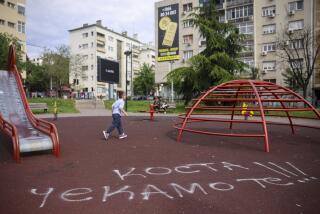Croatia in Turmoil Over Tribunal Cooperation
- Share via
BELGRADE, Yugoslavia — Croatia’s reformist, pro-Western government faced a political crisis Sunday after a Cabinet majority agreed that any citizens indicted by a U.N. war crimes tribunal should be arrested and extradited--a move that prompted four key ministers to quit.
The decision and the resulting political turmoil reflect continuing fallout across this region from the recent transfer of deposed Yugoslav President Slobodan Milosevic to the International Criminal Tribunal for the Former Yugoslavia in The Hague.
The Cabinet’s decision “to extradite Croatian generals is a trial against the foundations of the Croatian state,” Mirko Condic, head of the country’s largest association of war veterans, said Sunday.
But Croatian President Stipe Mesic issued a statement declaring: “It is known that during the war, there were crimes on the Croatian side too.
“The Croatian nation should not and will not be a hostage to those who bloodied their hands, bringing shame upon Croatia’s name--no matter what credits they might have otherwise,” Mesic said. He called on Croats to “maintain peace and dignity.”
The Cabinet acted late Saturday night under great pressure from tribunal prosecutor Carla Del Ponte, who visited the Croatian capital, Zagreb, on Friday to demand action against two indicted suspects. Del Ponte has sharply upped her demands for arrests of other indictees since the transfer of Milosevic, who is seen by many as the key figure in a decade of Balkan bloodshed.
The names of the indictees--the first Croatian citizens accused by the tribunal of committing war crimes in the country--have not been officially revealed. But Croatia’s state-run news agency, HINA, has reported that they probably are retired Gen. Ante Gotovina, a commander during the 1995 Operation Storm offensive against ethnic Serb-held territories in Croatia, and Rahim Ademi, a Croatian army general who is ethnic Albanian and who played a key role in a 1993 offensive. Ademi is believed to be a suspect in the killings of dozens of Serbs at that time, HINA said.
The walkout of the four Cabinet ministers, all from the Social Liberal Party, a key member of the ruling coalition, means that Prime Minister Ivica Racan’s government may now lack a parliamentary majority. The resignations are not official until Racan accepts them. He has already called for a confidence vote in parliament, which he is uncertain of winning.
While the pressure to arrest indictees causes political problems for Croatia’s reformers, who took power in elections early last year after a long period of authoritarian rule under the late President Franjo Tudjman, the arrest of Croatian suspects would be a great relief to reformers in Belgrade, the capital of both Yugoslavia and its dominant republic, Serbia.
Serbs ranging from ordinary citizens to Yugoslav President Vojislav Kostunica often complain that no Croatian citizens have been sent to The Hague for war crimes committed during the 1991-95 war in that country. Croatia has transferred to The Hague more than a dozen Bosnian Croats accused of war crimes committed in neighboring Bosnia-Herzegovina.
The decision by Serbia’s government to transfer Milosevic to the tribunal June 28 triggered the collapse of the Yugoslav Cabinet, which remains in a caretaker capacity as political negotiations proceed on trying to form a new national government.
Now that same scenario may unfold in Croatia.
“The government is collapsing,” screamed a headline Sunday on the front page of Jutarnji List, a major daily newspaper.
Social Liberal leader Drazen Budisa, explaining his party’s walkout from the Cabinet, told reporters in Zagreb that the indictments contain “unacceptable” allegations of “genocide and ethnic cleansing.”
“The indictments carry genocide charges and claim that the Operation Storm was planned to ethnically cleanse 150,000 Serbs from Croatia,” Budisa said.
Meanwhile, the war veterans association headed by Condic said it will use “the most radical measures” to prevent any hand-over of suspects to the tribunal, including road blockades and mass protests.
More to Read
Sign up for Essential California
The most important California stories and recommendations in your inbox every morning.
You may occasionally receive promotional content from the Los Angeles Times.









